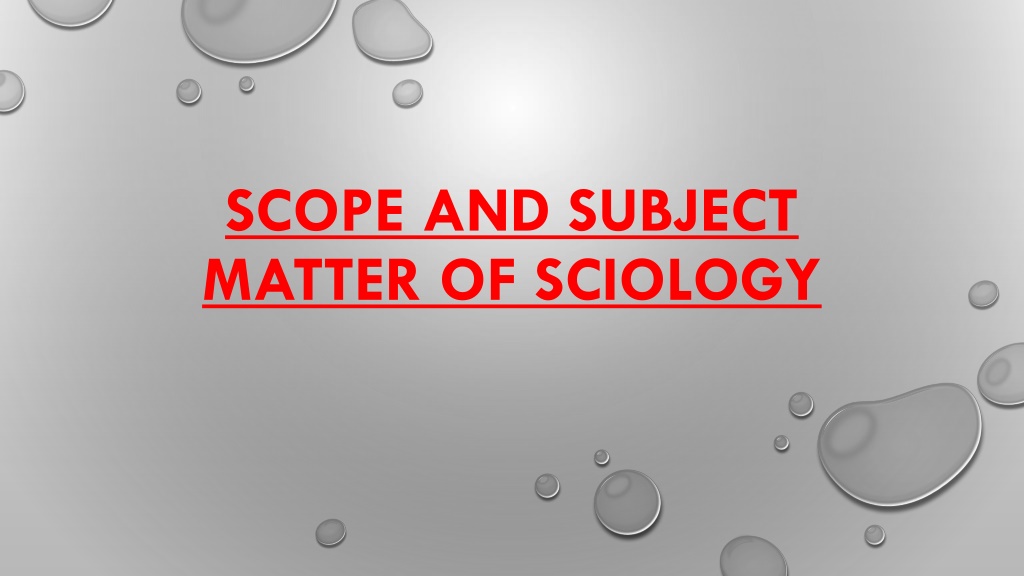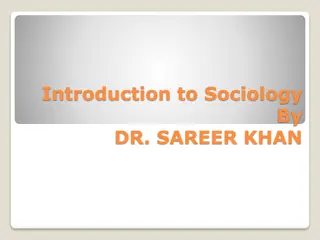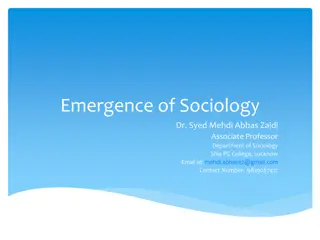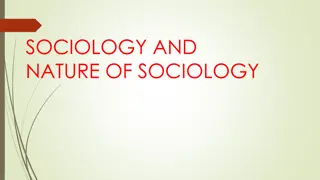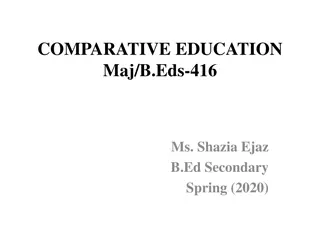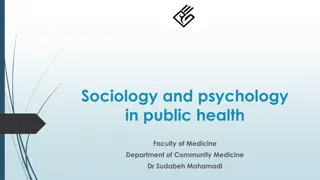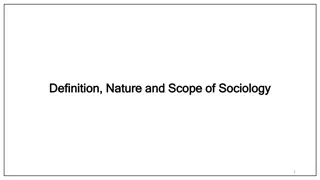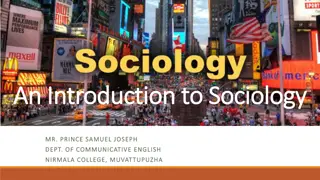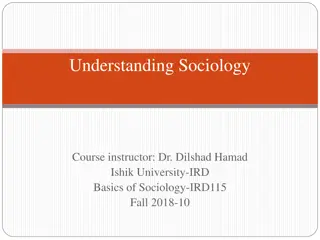Scope and Subject Matter of Sociology: An Overview
Sociology encompasses a wide range of studies, from individual interactions to global social processes. Sociologists have debated the scope and subject matter of sociology, dividing it into formal/specialistic sociology and synthetic/general sociology. Different scholars have proposed various approaches to studying social relationships and interactions, leading to diverse perspectives within the discipline.
Uploaded on Jul 23, 2024 | 4 Views
Download Presentation

Please find below an Image/Link to download the presentation.
The content on the website is provided AS IS for your information and personal use only. It may not be sold, licensed, or shared on other websites without obtaining consent from the author. Download presentation by click this link. If you encounter any issues during the download, it is possible that the publisher has removed the file from their server.
E N D
Presentation Transcript
SCOPE AND SUBJECT MATTER OF SCIOLOGY
SCOPE OF SOCIOLOGY Anthony Giddens has written, The scope of sociological study is extremely wide, ranging from the analysis of passing encounters between individuals in the street to the investigation of global social processes . Almost all earlier sociologists agreed on this view that the proper subject matter and scope of sociology is the study of social interactions and social relationships. But their approach of study has led them to form into groups. They have distinguished two major approaches of sociology to study society, viz., (1) Formal or specialist sociology, (2) Synthetic or general sociology Formal or Specialistic Sociology: Formal school argued in favor of giving sociology a definite subject matter to make it a distinct discipline. There is a group of German sociologists who have distinguished the forms and content of social relationships. They insist that sociologists should delimit their study of the forms of social relationships (competition, assimilation, conflict, cooperation etc.).And regarded sociology as independent. The contents of relationships should be left to be studied by other social sciences. Other followers of this view are F . Tonnies , Von Wiese, Vierkandt and Max Weber. Some American writers like Robert Park, Albion Small and E.A. Ross have also favored this view.
According to Simmel Sociology is a specific social science which describes, classifies, analyses and delineates the forms of social relationships or in other words social interactions should be classified into various forms or types and analysed. According to Von Wiese There are two kinds of fundamental social processes in human society. Firstly the associative process concerning contact, approach, adaptation etc Secondly disassociate processes like competition and conflict. Apart from these two processes a mixed form of the associative and dissociative also exists. Integration Each of these processes has sub-classes which in totality give approximately 650 forms of human relationships. Tonnies Divided societies into two categories namely Gemeinschaft (community) and Gesellschaft (association) on the basis of degree of intimacy among the members of the society. Max Weber According to him the aim of sociology is to interpret or understand social behaviour. But social behavior does not cover the whole field of human relations. Indeed not all human interactions are social. Sociology is concerned with the analysis and classification of types of social relationships.
Criticism of formal School It has emphasized on merely abstract forms and neglected the concrete contents of social life. Abstract forms separated from concrete relations cannot be studied. Ginsberg says that a study of social relationships would remain barren if it is conducted in the abstract without the full knowledge of the terms to which in concrete life they relate. No social form does exist independent of content . It is impossible as says Sorokin, to think of social institution whose form would not change when its content has changed. The conception of pure sociology is not practical as no social science can be studied in isolation from other social sciences. The contention of sociologists belonging to formalistic school that sociology alone studies the forms of social relationship is not correct. The study of international law includes the study of such relationships as conflict, war, opposition, agreement, contract etc.
Synthetic School of Sociology According to synthetic school, sociology is a synthesis of social sciences or a general science. This conception of sociology is held by the second group of sociologists, best exemplified by Durkheim, Hobbes and Sorokin ,Hobhouse ,Ginsberg ,Alex Inkels, Mannheim. The contention of this school is that all aspects of social life are interrelated; hence the study of one aspect of social life is not sufficient to understand the entire fact. For this reason sociology should systematically study social life as a whole. The subject mater of sociology and other social sciences is the same. But there is difference in their viewpoint. Society is the subject matter of all social sciences but they study it in their own perspectives. As sociology studies social life as a whole hence it is obvious that the scope of sociology is very wide.
Emile Durkheim: Emile Durkheim opines that the scope of sociology has three main divisions or field of study (a)Social Morphology Includes all those subjects which are fundamentally geographic such as population its size, density, distribution, mobility etc. (b) Social Physiology Social physiology has different branches such as sociology of law, sociology of religion etc. which are regarded as special sociologies. These branches deals with a set of social facts related to different social groups. (c) General Sociology the philosophical part of Sociology. It aims at discovering the general character of social facts and to formulate general social laws. (ii) L.T. Hobhouse: According to him Sociology is a synthesis of social sciences but the immediate task of Sociologist is threefold such as one must pursue his studies in his particular part of the social field . Keeping in mind the interconnections of social relations one should try to interconnect the results arrived at by different social sciences. Sociologist should interpret social life as a whole.
P.A. Sorokin: Sorokin opines sociology studies various aspects of the social relationships hence cannot be called as a special science. the study of relationship between various aspect of social phenomena. the study of relationship between the social and non-social . the study of general features of social phenomena. Alex Inkles: Another modern exponent of synthetic school Alex Inkles opines that the scope of sociology includes social analysis, primary concepts of social life, basic social institutions and social processes. Thus, it is concluded that the scope of sociology is very wide. It is both a social science and a special science. It synthesizes all special sciences. Society is the subject matter of all social sciences.
SUBJECT MATTER OF SOCIOLOGY
Views of Durkheim Durkheim considered social facts to be the subject matter of sociology. Durkheim has expressed the content of sociology in major parts. Social Morphology Includes all those subjects which are fundamentally geographic such as population its size, density, distribution, mobility etc b) Social Physiology social physiology has different branches such as sociology of law, sociology of religion etc. which are regarded as special sociologies. These branches deals with a set of social facts related to different social groups. (c) General Sociology the philosophical part of Sociology. It aims at discovering the general character of social facts and to formulate general social laws.
Ideas of Ginsberg Ginsberg presents the subject of sociology by dividing it into four parts. (i) Social Morphology Under this, those characteristics are studied which determine the size and shape of the society. For example, population size. (ii) Social Processes -Social relations are expressed between different individuals and groups as social processes. For example conflict, cooperation, competition, dominance etc. (iii) Social Control -Every society has its own rules laws and methods. The person has to follow. Control is required in society for a person not to act in an arbitrary manner. (iv) Social Pathology The study of social problem causing and social disintegrating conditions in the society is done under it. Prof. Inkles Book - what is sociology Sociological Analysis Human culture and society Sociological perspective Scientific method in social science
Primary Concept of social life Social action and social relationship Human Personality Groups Community Urban and Rural Association And Organization Population Society Fundamental social institutions Family and Kinship Economic Institution Political and legislative institution Religious institution Educational and Scientific Institution Recreative and welfare institutions Artistic and Expression Oriented Institutions.
Fundamental social Institution Differentiation and Stratification Co-operation , Accommodation and Assimilation Social Control Communication Socialization Social Evaluation Social Pathology Social Integration Social Change
RELATIONSHIP OF SOCIOLOGY WITH OTHER SOCIAL SCIENCES
SIMILARITIES BETWEEN SOCIOLOGY AND ANTHROPOLOGY Frazerdefined social anthropology as that branch of sociology that deals with primitive societies According to Radcliffe-Brownsocial anthropology is a comparative sociology . By the term comparative sociology , he would mean a science that applies the generalizing method of the natural sciences to the phenomena of the social life of man and to everything that we include under the term culture or civilisation . While anthropology was formulated as a holistic study of mankind and related aspects, Auguste Comte also considered that sociology would be the overarching study of human society. Both anthropology and sociology, following the model of science, combined description and generalization.
DIFFERENCES BETWEEN SOCIOLOGY AND ANTHROPOLOGY (1) The primitive, pre-literate people and their culture from the subject matter of anthropology. The completely human society is the basis of its investigation. It not only studies, the physical characteristics of the human race but also studies culture and social characteristics (kinship, language, religion, gender, art, etc.) . On the other hand, sociology takes note of the influence of the human race exerts on social relations, and it deals with people and their culture in the present context. (2) In sharp contrast to anthropological concern with small and static cultures, sociology investigates the culture of society which, to say the least is very vast and dynamic in nature. (3) It is really curious that sociologists can easily manage with the second-hand informations, while anthropologists cannot hut depend upon the first-hand knowledge. (4) Anthropology is concerned with the past where as sociology is concerned with the present. (5) Method of study (6) Sociology is a pure science and anthropology is a pure behavioral science. (7) Anthropology is a natural science while sociology is a social science.
Sociology and Psychology Sociology and Psychology determine the existence of humanity. While psychology caters to an individual s mind and how they express themselves through personality and behaviour , sociology looks at the communities the individual is part of and the influence of the communal identity of the individual. Similarities Between Psychology and Sociology Both psychology and sociology are social sciences that involve the study of human thought processes and behaviors. Both fields are concerned with improving people s lives and bettering society. Both professions utilize communication, interpersonal, analytical, research, listening, observational, and problem-solving skills. Both psychology and sociology degrees are versatile and can lead to a wide range of career opportunities
Relationship between History and Sociology Sociology and History are closely and intimately related to each other. Sociology cannot be separated from History and History cannot be isolated from sociology. That is why Professor G.E. Howard remarked History is the past Sociology and Sociology is the present History , . John Seely says that History without Sociology has no fruit, Sociology without History has no root . SIMILIRATIES BETWEEN SOCIOLOGY AND HISTORY State the similarities and differences between sociology and history. (i) Society is common between sociology and history. (ii) (ii) Both are social science disciplines. (iii) (iii) Sociology and history both are concerned with human activities and events. (iv) (iv) History is concerned primarily with the record of the past.
Difference between Sociology and History: Sociology is interested in the study of the present social phenomena with all their complexities. But History deals with the past events of man. It is silent regarding the present. Sociology is relatively a young social science. It has very short history of its own. It is not even two centuries old. But history is an age-old social science. It has a long story of 2000 years or even more. Sociology is an analytical science. But history is a descriptive science. Sociology is abstract in nature. It studies mostly regular, the recurrent and the universal. History is concrete. The historian is interested in the unique, the particular and the individual. Sociology is a generalizing science. Sociology seeks to establish generalizations after a careful study of the social phenomena. But History is an individualizing science. History rarely makes generalizations. It seeks to establish the sequence in which events occurred.
